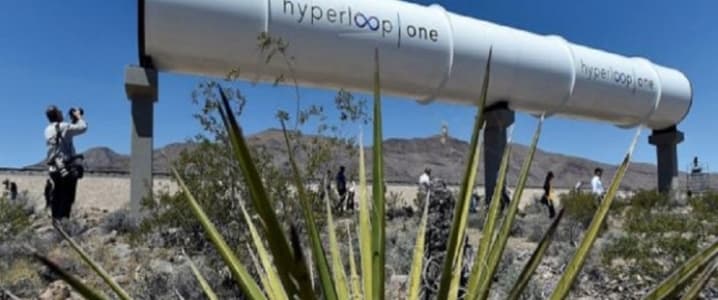Imagine a fossil-fuel independent world where those who don’t want to give up their road autonomy drive electric cars, while those who need to get from A to B as fast as possible whoosh at close to 1,000 mph in aerodynamic pods hidden behind air-free tunnels. No planes, no gas-guzzlers, no trains, just clean air, electric cars and time-saving Hyperloops.
Hyperloop One has announced that its first track test of Hyperloop technology was a success. The company was set up two years ago with the aim of turning into reality Elon Musk’s vision of a superfast and affordable public transport network using magnetic propulsion in a near vacuum. Related: Where Will Halliburton And Baker Hughes Go From Here?
The crux of Musk’s idea was a long, straight tube, almost completely evacuated, along which a transport pod will travel at high subsonic speeds. A journey from San Francisco to Los Angeles would take half an hour in such a pod at 760 mph or more. Impressive as this sounds from a technical perspective, what made the Hyperloop idea so appealing to various investors was that, according to Musk’s cost calculations, it was economically viable.
If you haven’t watched the video released by Hyperloop One, you might assume they built a tube and tested a pod in it. The future right here, right now. No. They built a track and tested a sled on this track, which cost $37 million to build. The whole thing looks – at least to the eyes of a non-engineer – remarkably similar to this magnetic levitation train built by General Atomics a few years ago. Related: EPA Launches New Methane Rules For Oil And Gas
The key difference, of course, is speed. Hyperloop One’s sled accelerated from 0 to 176 mph in just over a second. That’s certainly impressive as far as speed and acceleration goes, and serves as proof that a linear electric motor can propel objects forward and fast. And basically that’s all the test has demonstrated.
The problems that skeptics have identified with the Hyperloop technology, however, and which are well summed up here, have nothing to do with speed. They have to do with many issues, such as thermal expansion, for one – the steel pod is bound to expand from the heat in the atmosphere in California – which needs to be managed to avoid unfortunate events and increased costs. Related: Oil Prices Slip As Stronger Dollar Outweighs Bullish IEA Data
As noted above, affordability is one of the major advantages of the Hyperloop, but this affordability is also a target of Hyperloop skeptics. One analyst calculates the cost of the Hyperloop at $14 million per mile, which is almost twice that of Musk’s calculation, but still much cheaper than a bullet train for the state of California. A New York Times survey among various experts revealed that the true cost of the Hyperloop could be more like $100 billion for the stretch from San Francisco to L.A. If accurate, the Hyperloop would lose some luster since the high-speed train track between the two cities has been calculated to cost a more reasonable $68 billion.
The Hyperloop could well be a game-changer, albeit a possibly expensive game-changer—possibly much more expensive than currently believed. And still, it could disrupt everything from freight transport to air travel, putting the last nail in the coffin of the oil industry if it presents an alternative mode of travel between major cities . But this just won’t happen anytime soon. Not until new materials, construction methods and tech make it economically viable as well as reliable at the same time.
By Irina Slav for Oilprice.com
ADVERTISEMENT
More Top Reads From Oilprice.com:
- Iran Hits Saudis Where It Hurts, Offers Discounts On Asian Crude
- Are Subsidies Killing US Solar Companies?
- Energy Sector Hit With Two More Big Bankruptcies

















starting to look like a scam,.................